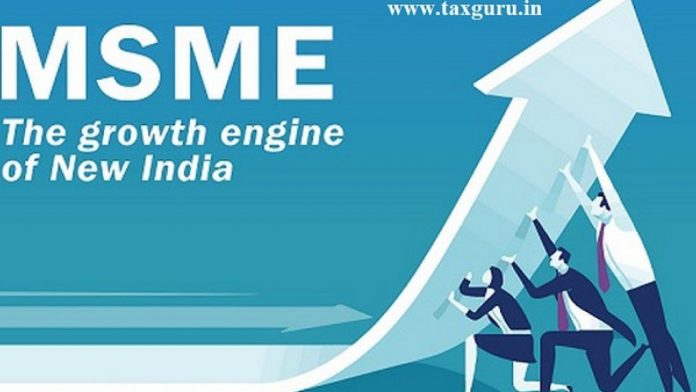This article is written by Chitrakshi Mohnot, a lawyer and a student of the Institute of Company Secretaries of India and also enrolled in Diploma in Law Firm Practice: Research, Drafting, Briefing and Client Management by Lawsikho. This article has been edited by Ojuswi (Associate, Lawsikho).
This article has been published by Sneha Mahawar.
Table of Contents
Introduction
MSME stands for Micro, Small, and Medium Enterprise enacted under the Micro, Small and Medium Enterprises Development (MSMED) Act, 2006. It is the apex executive body for the formulation and administration of rules, regulations and laws relating to micro, small and medium enterprises in India. MSME is initiated and managed under the Ministry of MSME (MoMSME), with an objective to facilitate, promote and enhance the competitiveness of MSMEs in the respective state/s/country and which covers entities engaged in the production, manufacturing, processing or preservation of goods and commodities.
The MSME sector is considered the backbone of the Indian economy that has contributed substantially to the socio-economic development of the nation. It generates employment opportunities and works in the development of backward and rural areas.
As per the official data as of 31st Aug 2021, there are presently approximately 6.3 crore MSMEs in India. MSMEs contribute to approximately 8% of India’s GDP, employ over 60 million people, and have an enormous share of 40% in the export market and 45% in the manufacturing sector. The number of MSMEs in India increased the Compound Annual Growth Rate (CAGR) by 18.5% from 2019 to 2020. The budget allocation for the financial year 2022 has doubled to Rs. 15,700 crores as compared to Rs. 7,572 crores in the financial year 2021.
The Sector is fairly diversified including activities in the agro-based industries and accommodating surplus labour from structural transformation, and service centres in the rural hinterland. Further, MSMEs also partner and collaborate with domestic and external enterprises to develop manufacturing and multipronged supply chains. The MSMEs are widening their domain across sectors of the economy, producing a diverse range of products and services to meet the demands of domestic as well as global markets. The article aims to analyse the draft MSME policy issued by the Government of India.
Need for policy
The need for policy is for promoting competitiveness, technology up-gradation, infrastructure, cluster development, dedicated credit, procurement of products & financial assistance to MSME, to build an eco-system that is vibrant for the rapid growth of MSMEs, promoting a Conducive Business Environment covering ‘ease of doing business (EoDB) and providing suitable exit route. For inclusion in the state-level policies, a comprehensive framework of strategies and actions for suitable adaptation is required. The draft policy document needs wider dissemination, debate and feedback from stakeholders to firm up a national policy for follow-up at the intergovernmental level.
The Ministry of MSME in its draft National Policy for MSMEs in India has recommended “specific action areas” to ensure the sector’s speedy growth. The action areas include Intergovernmental Roles & Responsibility, Legislation and Regulatory Framework for MSMEs in India, Access to Finance/Financial Assistance for MSMEs, Technology Up-gradation/ Adaptation, Skill Development, Knowledge Management, Ease of Doing Business, Development of MSME Code and Exit Code. The Micro, Small and Medium Enterprises) (MSMEs) is a highly vibrant and dynamic sector. Here is a brief analysis of the action areas of the draft policy.
Intergovernmental role and responsibility
For the development of the MSME sector, the three-tier system of governance plays an important role as a facilitator so the respective level of government is expected to take specific actions. National government actions are: (a) alignment of national policy documents at the state level, (b) developing standard registration procedures & interstate platform for exhibitions & seminars, (c) reviewing the regulatory framework, and (d) promoting R&D activities for development, (e) developing the framework for supply chain mechanism, (f) developing synergy with ministry initiatives, (g) identifying MSME action agenda, (h) developing measures to safeguard employees, (i) reviewing composition periodically, (j) promoting 3 tier system of MSME promotion council, (k) strengthening P2P system, (l) developing model bylaws memorandum under MSME amendment act, (m) developing integrated database, a network of sharing technology, documenting best practices, (n) creating online access or grievance redressal mechanism, (o) developing suitable tracking mechanism for speedy payment.
State government actions are: (a) development of state policy in line with national policy on MSME, (b) state facilitation councils or promotion councils, (c) identifying focus areas, (d) stakeholder meetings at the state level, (f) updating database regularly, (g) documenting best practices, (h) help with value chains creating or linking the enterprises, (i) integrate the state portals with national-level portals.
District government actions are that: (a) districts should be focal points at the sub-state level of the MSME framework, and (b) MSMEs facilitation centres should have a wider representation of all stakeholders.
All the actions specified by the three tiers governmental system will lead to the strengthening of the MSME sector, which in turn, provides employment at the immediate local level and will diminish latent unemployment and effective utilisation of local resources will happen due to these actions. Thus, generating revenue at the district level will result in improving infrastructure and these types of steps will minimise the movement of local area workers to other parts of the country, saving them from various hardships.
At the district level, implementing these actions becomes impossible due to the low level of accessibility of funds and scarce technical help. Further, Underdeveloped infrastructure makes it difficult to grow at a faster pace.
Legislation / regulatory framework for MSME’s in India
The major steps for simplification of regulatory norms have been taken by the ministry of MSME by bringing appropriate changes in the classification criterion of MSMEs. These are:
- the regulatory system in each state is required for MSMEs;
- an increasing number of facilitation councils is needed in each district to deal with delays and pendency of cases;
- promoting awareness of “Samadhaan” among MSME borrowers;
- In case of insolvency of any organisation, MSME dues should be the main priority;
- for the smoother exit of MSME, emphasis should be laid on developing an appropriate legal system by the respective state governments;
- developing an online system for resolving grievances by local agencies appointed by the state governments;
- for minimising the incidence of NPAs and improving liquidity disputed cases to be solved within 90 days;
- simplifying the process of registration and licensing of micro, small and medium enterprises as well as simplifying the process of approvals/inspection;
- bringing uniformity among all states by adopting the model law;
- need to develop MSME code and setting up of various agencies for ease of doing business;
- there is need for recognizing a comprehensive and settled exit policy which will simplify a complex lot of laws and will lay emphasis on smooth and friendly creation of MSMEs.
Ease of doing business will create more enterprises, resulting in wealth and employment creation, which in turn will infuse greater transparency, as many compliances requirements have become irrelevant and unnecessary, which will enable them to focus on their core activities
Online facilities provide a fair and speedy means of dealing with complaints. Uniform laws will create a simpler and more efficient system of laws by cutting red-tapism and consistency across the whole country. With uniformity in-laws, no biasedness will remain towards a particular state.
With the ease of doing business being introduced, there is a great possibility of enterprises flouting the many norms and eventually going bust. Generally, MSMEs are so small that they are unable to understand the nitty-gritty of online submission of queries. As India has diverse cultural backgrounds in each of the states, it is impossible to adopt one model law. MSME policy also emphasizes on setting up of various agencies but it is not practically possible to have coordination between various government departments. The Gamut of laws will create problems for MSMEs, however, they may be simple.
Access to financial/financial assistance to MSME’s
Due to delay in accessing the necessary finance, the draft policy has directed some schemes along with steps like:
- laying emphasis on improving easy sources of finance by introducing uniformity and by simplifying the loan process;
- evaluating of creditworthiness of MSME borrowers by using various methods to facilitate;
- speedy in-principal approval for bank and setting up of various schemes like Scheme of Fund for Regeneration of Traditional Industries (SFURTI) and Scheme for Micro & Small Enterprises Cluster Development Programme (MSE-CDP) along with the existing schemes.
Concessional rates are not easily available as far as small amounts are concerned, as there is a question mark on the credit worthiness of MSMEs in the initial stages and speedy approval is very difficult due to the working environment in public sector banks.
Technological upgradation
In the draft policy, the focus is on implementing the new age technology by developing indigenous technology through technological collaboration with global partners, adapting to new processes and attention to quality. it also emphaises on creation of Centres of Excellence with specialized staff, to periodically study issues faced by MSMEs, and establishment of incubation centres for product development and linking them with respective enterprises.
It also focuses on removing the problem of lack of skilled workforce and adaptation to technology by the unskilled workforce. It also talks about ensuring technology linked skill development at every district, by creating Tool Room Training Centres across the country.
The technological up-gradation suggested in the draft policies, will create new industrial units as well as employment opportunities for our skilled and unskilled labour force by training them, which will increase productivity, and reduce time and operating costs.
One of the pressing issues that are impeding Msme’s growth and development in India is the lack of advanced technology and up-gradation from time to time and it also makes small businesses unattractive in the international export market. For any industry or sector to grow, it should be ready to face the advancement in technology. The government should promote such upgrades and adaptations through its policies and other advancements in terms of finances and resources.
Skill development
In the draft policy, nodal centres in the district should be set up for skill development training upon the demand of skills required by enterprises and the details of programmes to be provided by the training entities in the next six months. Also proposed creation of cell in the distinct industries centre, about the training programmes to be conducted and also demand request made by them. A Calendar of various short-term training programmes should also be prepared and published on the websites by various entities and cells along with its awareness activities should also be carried out.
Training programmes provided to the MSMEs will help them in getting trained manpower, thus improving their productivity. Trained manpower will also be eligible to get higher wages.
As Most of the time, MSMEs will be reluctant to train their manpower due to a lack of understanding. Training Programme Information may not reach every enterprise.
Knowledge management
For internal and external processes of an enterprise, creative & innovative knowledge management and artificial intelligence are to be promoted. At the central level-one Network for all the MSME linked offices are proposed for generating information through data analytics and identified entities to be provided with statutory, legal and financial support for knowledge creation & dissemination and also support for incubation to promote knowledge-based innovative ventures.
In the case of state government, state MSMEs data are to be linked with a central aggregator to appraise the enterprises about the uses of artificial intelligence in the concerned sectors, further, enterprises and entrepreneurs should be encouraged to share relevant information to be hosted on the website.
At the local level, encouraging especially rural areas’ entrepreneurs and enterprises, to use online processes for updating data and information on the central portal for conducting their businesses as well as to share and communicate knowledge with stakeholders. Coordinate with local levels and district levels agencies like financial institutions, insurers, and training institutions using data analytics and artificial intelligence.
Promoting artificial intelligence is the need of the hour as it will make online processes faster and speedier. Real-time data should be used in the promotion of businesses which will make them compete at the international level.
The Lack of Funds and technical expertise at the local level makes it very difficult to adopt technology in the MSME sector. Many entrepreneurs are reluctant to train their personnel for the adaptation of technology.
Ease of Doing Business (EoDB)
For trading across borders, simplification of the procedures at the export terminals is required. There should be linking of MSME centres with transport infrastructure, which in turn should be linked with export terminals. There should be designated officials appointed at all the major ports to attend to the problem related to import/export procedures for MSMEs. Further, Cheap and readily accessible legal help at the district level to MSMEs should be provided for enforcing contracts,
Availing all the facilities smoothly will not be an easy job, as government machinery works slowly. Further lack of funds works as a deterrent for all infrastructure-related work and although cheap legal help will be provided but in reality, it is a very lengthy process.
Exit code
In the exit code alignment of MSME with fast track insolvency resolution process under IBC code 2016 is required. Arbitration routes to settle disputes speedily are required as well as rehabilitation of sick MSMEs is given by setting up an independent rehabilitation fund. Banks can issue early warning indicators so that data input can be monitored by partners and setting up independent rehabilitation funds will help to recover from the financial loss but the distribution of funds to the required MSMEs is the main concern.
Conclusion
The draft policy is made with the main emphasis on growth orientation and sustainability & to stimulate the overall productivity and efficiency of the MSME sector. There was a need for this policy for the Indian economy to stimulate employment at the local level and to utilise local resources so that even a small unit of India remains independent, this type of policy will encourage technical expertise while providing large-scale employment to local unskilled/ semiskilled workers. They will generate revenue for the state government. It will facilitate states to sustain themselves without being dependent on the central government.
MSME sector contribution to the Indian economy has been significant, but the policy should be made for the long term, as development takes time. The Majority of MSMEs do not grow over a period of time due to a lack of technical expertise and funds. Additional funds should be provided by International Bodies. The Institutional mechanism, budgetary allocation and mechanism to overview the policy should be the main ingredients of the policy. Last but not least MSMEs are the backbone of the economy, they exist in each and every sector of the country.
References
- http://www.dcmsme.gov.in/Draft08022022.pdf
- https://static.mygov.in/rest/s3fs-public/mygov_1647363615105880381.pdf
- https://static.mygov.in/rest/s3fs-public/mygov_1646070502105369891.pdf
- Draft National MSME Policy -A Discussion Paper –Comments by Yerram Raju Behara
- https://www.researchgate.net/publication/358999887_Draft_National_MSME_Policy_- A_Discussion_Paper_-Comments
- https://taxguru.in/corporate-law/draft-national-policy-micro-small-medium-enterprises-india.html
- https://static.mygov.in/rest/s3fs-public/mygov_1646276262105408351.pdf
- https://www.financialexpress.com/industry/sme/msme-eodb-govt-releases-draft-msme-policy-proposes-8-action-areas-to-overhaul-the-sector/2435761/
- https://www.taxmann.com/post/blog/new-draft-national-policy-for-msmes-to-address-specific-key-action-areas-an-overview/?amp
- https://inc42.com/features/draft-national-msme-policy-proposes-tech-upgradation-and-8-other-areas-for-msmes/
Students of Lawsikho courses regularly produce writing assignments and work on practical exercises as a part of their coursework and develop themselves in real-life practical skills.
LawSikho has created a telegram group for exchanging legal knowledge, referrals, and various opportunities. You can click on this link and join:
Follow us on Instagram and subscribe to our YouTube channel for more amazing legal content.
 Serato DJ Crack 2025Serato DJ PRO Crack
Serato DJ Crack 2025Serato DJ PRO Crack














 Allow notifications
Allow notifications


